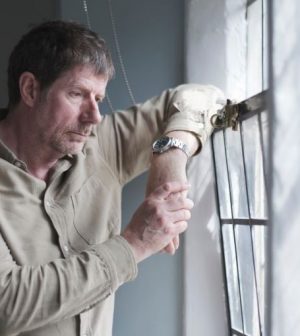- Could Your Grocery Store Meat Be Causing Recurring UTIs?
- Are You Making This Expensive Thermostat Error This Winter?
- Recognizing the Signs of Hypothyroidism
- 10 Strategies to Overcome Insomnia
- Could Artificial Sweeteners Be Aging the Brain Faster?
- Techniques for Soothing Your Nervous System
- Does the Water in Your House Smell Funny? Here’s Why
- Can a Daily Dose of Apple Cider Vinegar Actually Aid Weight Loss?
- 6 Health Beverages That Can Actually Spike Your Blood Sugar
- Treatment Options for Social Anxiety Disorder
Being Isolated May Shrink the Aging Brain

Older adults who regularly spend time with family and friends may have bigger brains to show for it, a new study suggests.
Healthy brain aging is a complex matter, and researchers are still trying to understand which factors keep the mind sharp and which ones feed declines in memory and thinking.
But a number of studies have suggested that social life matters. Social stimulation is thought to help support mental acuity; on the other hand, social isolation in the golden years has been linked to an increased risk of dementia.
Exactly why, though, is unclear.
So for the new study, researchers led by Dr. Toshiharu Ninomiya, of Kyushu University in Japan, asked a different question: Is social isolation connected to older adults’ brain volume?
The brain naturally “shrinks” to a degree as people age, reflecting the loss of nerve cells and their connections. But that tissue loss is accelerated during the dementia process.
If older people who are isolated tend to have smaller brains, the researchers reasoned, that might help explain the link with dementia.
It turned out there was indeed a relationship, although not a causal one, according to findings published July 12 in the journal Neurology.
Among nearly 9,000 Japanese adults aged 65 and older, more than 600 said they “seldom” saw or spoke with friends or relatives outside their household. And those participants typically showed a smaller brain volume on MRI scans, versus those who were more socially active.
Specifically, they had less tissue in certain brain structures involved in memory and known to be affected in the early stages of dementia.
Experts not involved in the study stressed that it does not prove social isolation shrinks the brain.
One possibility is that the brain shrinkage came first, said Dr. Joel Salinas, a neurologist at NYU Langone Health in New York City, and chief medical officer of Isaac Health, an online memory clinic.
People in the early stages of the dementia process could have had some subtle symptoms and changed their behavior (including staying home more), said Salinas who had no role in the study.
On the other hand, there are plausible reasons that social connections, or lack thereof, could affect brain volume.
To the extent that isolation causes chronic stress, Salinas said, that might take a toll on the cardiovascular system and the aging brain.
At the other end of the spectrum, he said, older people who regularly have mental and social stimulation may build up a greater “cognitive reserve.” That refers to a person’s capacity to withstand some of the pathological changes that can happen in the aging brain, without losing their memory and thinking abilities.
Dr. Danielle Sandsmark, a neurologist at the University of Pennsylvania in Philadelphia, agreed that the “chicken-and-egg” question remains.
“This study doesn’t draw a line from social isolation to smaller brain volume to dementia,” said Sandsmark, co-author of an editorial published with the findings.
Still, both doctors said, the study adds to a body of evidence that social factors are connected to brain health.
It also suggests that depression is part of the story. When the researchers factored in participants’ reported depression symptoms, that seemed to account for 15% to 29% of the relationship between isolation and smaller brain volume.
Beyond that, older adults who seldom got out did tend to be in poorer health, more often having diabetes or high blood pressure than other study participants. They were also more likely to smoke or get little exercise.
Yet those differences did not explain away the link between social isolation and brain volume.
Sandsmark emphasized that the study does not spell doom for seniors who are not social butterflies. Many factors influence dementia risk, and social isolation would be just one, she said.
And importantly, not everyone who spends a lot of time alone feels lonely.
“People fill their emotional tanks in different ways,” Sandsmark said. For some, reading a good book might be the most enjoyable way to engage the mind.
Salinas, too, noted that social isolation does not necessarily translate to loneliness. One older adult might see or talk to many people, but not have anyone who listens and offers support. Another older adult might have that one person.
Salinas said that studies need to move on to the “intervention” question: What kinds of social support can help older adults feel and function better?
For now, he suggested that people think about how they can nurture good relationships in their lives. That may mean reaching out to a friend or relative they haven’t seen for a while, he said, or trying an activity that allows them to make new relationships.
More information
The Alzheimer’s Association has advice on healthy brain aging.
SOURCES: Joel Salinas, MD, MBA, clinical assistant professor, neurology, NYU Grossman School of Medicine, New York City, chief medical officer, Isaac Health; Danielle Sandsmark, MD, PhD, associate professor, neurology, University of Pennsylvania Perelman School of Medicine, Philadelphia; Neurology, July 12, 2023, online
Source: HealthDay
Copyright © 2026 HealthDay. All rights reserved.










